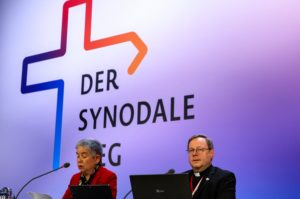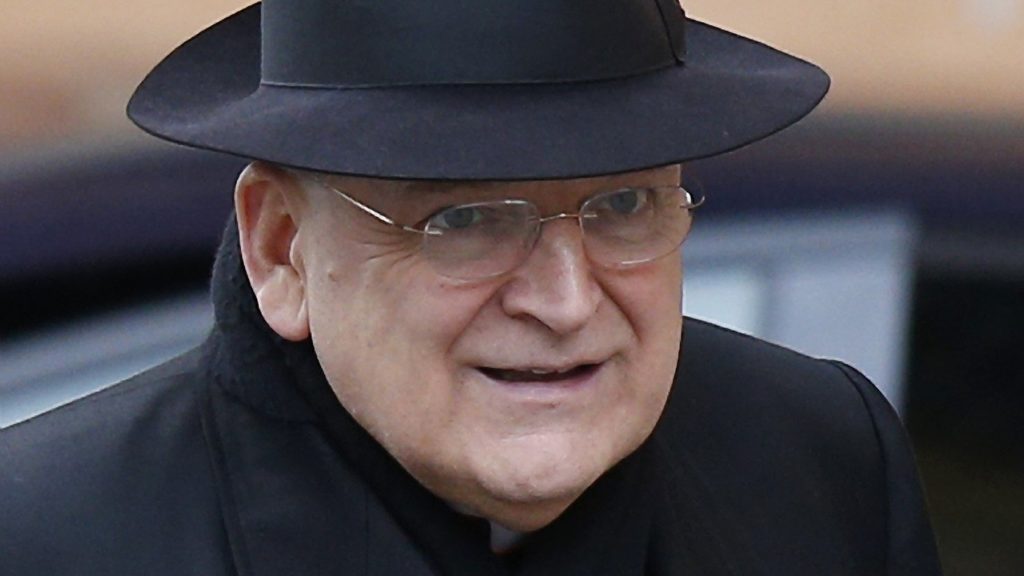ROME — Suppose you’re a progressive German Catholic these days, excited by the reform course sketched by your country’s Synodal Way, especially its resolutions calling for a reevaluation of Church teaching on women’s ordination and homosexuality.
If so, no doubt you’re a bit concerned about recent statements from Rome seeming to throw cold water on those ideas, including a letter from Pope Francis to four female theologians warning that Germany is moving “increasingly away from the universal Church’s common path” and a Vatican letter to the secretary of the German bishops’ conference bluntly warning that women priests and questioning the sinfulness of homosexual acts are no-fly zones.
The question you might have about all this, however, is how seriously to take it. In other words, it’s clear the Vatican is warning Germany to slow down, but should this be taken as a yellow light — “proceed with caution” — or red, meaning “stop right now”?
If you’re a hypothetical German Catholic thinking along these lines, you’re probably also aware that yours is not the only national church around the Catholic world with which Pope Francis recently has been wrestling.
You undoubtedly know that last month the pope fired an American bishop, Joseph Strickland of Tyler, Texas, and also recently decided to strip American Cardinal Raymond Burke of his Vatican apartment and salary. Both acts were clearly seen as drawing lines in the sand for the conservative-traditionalist wing of American Catholicism, basically saying that you can’t publicly defy the teaching and authority of the pope and expect to remain on the Church’s payroll.
It also won’t have escaped your attention that at least so far, the pope has not taken similar actions with regard to anyone involved in the German situation. You might be tempted to conclude that whatever the issues with Germany may be, they don’t rise to the level of a firing offense and, therefore, that there’s still some wiggle room to keep moving forward.
That, in a nutshell, would seem to be the problem Francis faces: how to get across to the German church that “no means no”?
Granted, the situations are different.
Strickland has all but accused the pope of heresy and schism, and also has quoted from a letter describing Francis as a “usurper.” In addition, an apostolic visitation reportedly turned up various administrative problems in his diocese, though their precise nature has not been identified. Burke, while more circumspect, nevertheless has lent his support to people who espouse similar positions, and has also twice now been part of a group of cardinals submitting critical “dubia” to the pontiff challenging his positions on various issues.
Meanwhile, the German bishops supportive of the Synodal Way have not engaged in any such direct criticism of the pope. Indeed, prelates such as Bishop Georg Bätzing of Limburg, president of the German bishops’ conference, generally go out of their way to stress their filial devotion to Rome and to the pope.

(Last January, Bätzing did grouse out loud that Francis’ “way of leading the Church by way of interviews” is “extremely questionable,” but if every Catholic bishop in the world who questioned the wisdom of the pope’s media strategy were to be fired, the list of vacant dioceses would be awfully long.)
During October’s Synod of Bishops on Synodality, Bishop Franz Josef Overbeck of Essen, another major proponent of the German experiment, rejected the idea that the country is drifting out of the orbit of the universal Church.
“Many people have asked me, ‘Are you still Catholics and part of the Catholic Church?” said Overbeck. “And I say, ‘Yes, of course, we are Catholics, and we are here to stay.’ ”
So, in the American case the pope was responding to prelates who, albeit in varying ways, were engaged in public criticism of his leadership, while the Germans often seem to do everything in their power to play down impressions of a rift.
Yet one could make the argument, and many do, that linguistic legerdemain aside, what’s happening in Germany does represent a challenge to papal (and, more broadly, episcopal) authority every bit as serious as anything suggested by the likes of Strickland and Burke.
The Germans, for instance, so far appear determined to press ahead with plans for the creation in 2026 of a “synodal council,” composed of both laity and bishops, which would have as yet loosely defined governing powers over the Church. This development comes despite the fact that in a January letter signed by three Vatican heavyweights, the Germans were explicitly told that doing so would amount to an unacceptable surrender on the exclusive role of the bishop to teach and to govern.
The average German Catholic might be forgiven, however, for wondering if such verbal warnings amount to sound and fury signifying nothing, as long as the prelates signing off on these decisions do not suffer any consequences for doing so.
At the moment, the German bishops are scheduled to take part in meetings with Vatican officials in January, April, and June 2024 to discuss their Synodal Way, and presumably the agenda on Rome’s side will be to rein in at least some of the centrifugal energies swirling in the German church.
The question for Pope Francis may be how to get across that he’s serious — including the possibility of adopting, however reluctantly, an “American solution” for one or two recalcitrant German prelates too.

